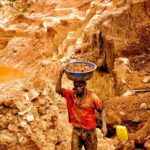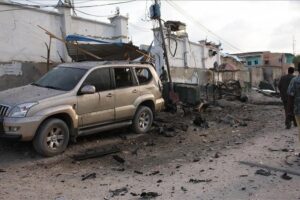Ghana — Police killed one person and injured four others while attempting to clear trespassing miners from the Wassa gold mine at Benso in Ghana’s Western region. The owner of the mine, Golden Star Resources, says small-scale miners who have encroached on an abandoned part of its concession area have been impeding its operations.
Golden Star began operating at Benso in 2009, but suspended mining activity in 2012 as the price of gold declined. The company returned to the site in 2022, but during the decade the mine was inactive, some Benso residents had begun artisanal mining for gold in the abandoned pit. Others planted cocoa trees inside the 500-meter (1,640-foot) buffer zone that surrounds the concession.
When it resumed operations last year, the company held a public meeting with the community, warning the small-scale miners to stop trespassing and interfering with Golden Star’s operations. But Frank Afful, a member of the Benso town council, said locals still continue to dig for gold at the Wassa mine.
“The area is a security zone, so people are not supposed to go there, but these illegal miners go there to mine,” he told Mongabay, “and the company have warned them countless times they wouldn’t listen and are still mining.”
On the morning of March 23, Golden Star’s security guards, accompanied by police, attempted to clear illegal miners from the site so that blasting operations could take place. The miners resisted and in the violence that followed, four miners were injured and police say they accidentally shot and killed 21-year-old Mohammed Yaro.

According to the mine’s corporate affairs manager, Gerard Boakye, the miners who had been violently driven off returned to Golden Star’s premises later that day, accompanied by more than 100 other community members, and set fire to eight trucks, an excavator, fuel tankers and dozens of other vehicles, including a company-owned ambulance that has served both the community and company workers.
They also set fire to the company’s offices; its staff fled the site. Golden Star has suspended its operations and police are investigating the incident.
‘Toxic legacy’ in Nigerian community as ExxonMobil plans exit
IBENO, Nigeria — As oil giant ExxonMobil prepares to sell its onshore and shallow-water assets in Nigeria to a local firm, people living in its production areas say the oil major is leaving behind a devastated environment and refusing to negotiate and remediate polluted soil and waterways.
In February 2022, ExxonMobil announced it was selling 300 oil wells and 90 shallow-water and onshore platforms to a Nigerian firm, Seplat Energy, for $1.3 billion. ExxonMobil said it will now focus on deep-water operations.
In the southeastern state of Akwa Ibom, ExxonMobil’s operational base in Nigeria since 1961, residents say the company has not resolved several spill-related compensation and remediation claims in Ibeno, a fishing town near the Atlantic Ocean. Decades of oil production there have contaminated land and water, making it difficult for locals to fish or farm.
“Since they announced the sale, we have sent many letters and petitions, but Mobil has not answered,” Godwin Efanga, president of the town council of Upenekang, Ibeno’s main community, told Mongabay.
“They want to leave after damaging the environment without compensation.”
Between 2010 and 2021, major transnational oil companies have completed 26 significant sales, retaining interests only in deep-water production or leaving the country entirely, according to the Stakeholder Democracy Network, a nonprofit focusing on the impact of the extractives industry in the Niger Delta.
The companies say they’re divesting in favor of cleaner energy and because of security concerns in some areas. But the democracy group says the firms have also been unsettled by recent cases in which affected communities successfully sued companies for damage to the Niger Delta in U.K. and Dutch courts.

Nigerian President Muhammadu Buhari withdrew an initial approval of the ExxonMobil sale following a protest by state-oil company NNPC, which argued it had first right to buy the assets. In February this year, Seplat said it was confident it would conclude the transaction before Buhari leaves office in May.
A new petroleum industry law enacted in 2021 requires oil companies abandoning their assets to set up a “decommissioning fund.” At a March 22 event calling attention to pollution in the area, representatives of Ibeno said ExxonMobil has not done this. They also said the oil giant has not conducted a comprehensive audit of impacts of its operations in the area.
ExxonMobil spokesperson Oge Udeagha, did not respond to requests for comments after initially asking for questions to be sent via text message.
“Communities like Ibeno complain that they were not consulted when ExxonMobil started oil exploitation in their communities. They now feel insulted and abused by the same corporation divesting without any level of consultation or communication with them,” said Nnimmo Bassey of the Health of Mother Earth Foundation.
“They see the company as trying to foist a toxic legacy on them and shrug off their responsibly to remediate, restore the polluted environments and make do reparations.”
Corporate profits derailing South Africa’s ‘just transition,’ group says
JOHANNESBURG — A South African environmental justice group warns that fracking and drilling into coal beds to extract gas will have devastating environmental impacts and cannot form part of a just transition to cleaner energy sources.
Afro Energy, a local subsidiary of Australian gas explorer Kinetiko Energy, has developed 30 pilot wells in the Amersfoort area of South Africa’s Mpumalanga province, where it intends to frack for coal bed methane. The company has exploration rights covering 7,000 square kilometers (2,700 square miles) of the province, and has claimed that the gas resources beneath that land could be as much as 4.9 trillion cubic feet.
But speaking at the March 24 launch of a report analyzing South Africa’s energy transition, environmental justice group groundWork said drilling into coal beds in search of gas only prolongs the use of polluting fossil fuels and poses a serious threat to water supplies. The report also questioned claims from another company, Rhino Resources, that it was seeking a license to drill wells for helium and biogenic methane in South Africa’s central Free State province. (Biogenic methane, a potent greenhouse gas, is produced by decomposition of organic material currently in the life cycle, but the company’s applications do not indicate where anything other than coal bed methane — adding carbon that has been locked beneath the earth for hundreds of thousands of years — might be found.)
Bobby Peek, groundWork’s director, said reorienting South Africa’s economy away from coal toward cleaner alternatives risks being derailed by companies seeking profits.
“Every established corporate is embracing the process. But so are very many ‘fly-by-nights’ that seek to climb into the Mpumalanga space to offer solutions that can make them a buck off the promise of a new tomorrow for the community.”
GroundWork’s report says plans for expansion of gas production must be resisted and warns that if the just transition is wholly profit-driven, a shift away from coal in places like Mpumalanga will exclude ordinary people. The environmental justice group recommends that communities set up their own projects to grow food and produce energy in a bid to become self-sufficient.
Source : Mongabay















